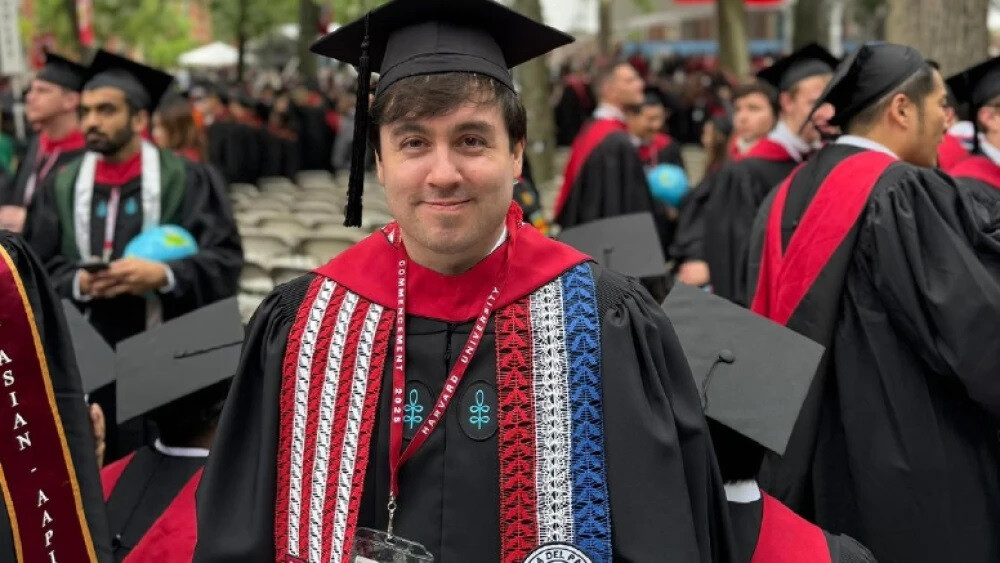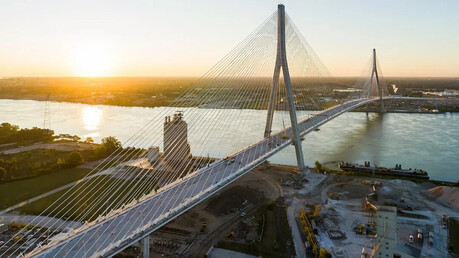
ASUNCIÓN – David Riveros García (34), a young activist from Paraguay, has become a proud graduate of Harvard Kennedy School, one of the world's most prestigious universities, earning his Master in Public Administration. He recalls the moment he received his Harvard acceptance alongside his brother in the small house on Street 6 in Hernandarias, where he spent his childhood, revealing that it wasn't just a moment of joy.
"It was a painful moment. It was the pain that someone like us, who hadn't received an elite education, wasn't born with a certain surname, wasn't 'the son of someone,' and inherited nothing but our parents' sacrifices, had reached that place. It was the pain of knowing it was my responsibility to shatter the saying 'if you want it, you can do it,' because many people wanted it more and sacrificed more than I did, but they never had the opportunity."
David was born in Hernandarias and grew up in Ciudad del Este, but due to his family's roots and deep affection for the Ñeembucú region, he considers himself a 'Pilarense.' He introduces himself as "the proud son of a former shoeshiner and a girl adopted from the streets." His parents barely finished high school themselves, his mother only doing so when David was in the sixth grade.
"I didn't receive much formal education, but I grew up in the shadow of giants with an unbreakable dignity." He states that his story isn't an exception, but a reflection that guided him to let forgotten communities resist, share what they have, and always dream with their feet firmly on the ground.
The Harvard Experience: Reflection on Structural Inequality
David avoids the common narrative that his Harvard experience is "proof that Paraguayans can also make it through sacrifice and effort." He argues that such a perspective "obscures structural inequality." For him, studying at Harvard demonstrated how much more effort students from public education must put in to reach the same position that other students achieve with less effort and more resources. "Even today, a student who scores 2 or 3 on the ASA (private school entrance exam) is still better prepared than a public school student who strives to get a 5."
That's why he emphasizes the need to work together to change this situation. He advocates for collaboration between public education and the best private schools. "We don't need more Harvard graduates to solve our nation's problems; we need to listen to the voices within us."
During his two-year master's program at Harvard, David experienced inner reflection and personal challenges. He took classes with students from diverse backgrounds, from persecuted activists to Trump supporters. "I found myself in both my flaws and my strengths."
He became the first Paraguayan to receive multiple awards at Harvard without actively seeking them, including the prestigious Gleitsman Leadership Fellowship and the Cheng Fellowship, considered among the most important awards in social innovation. Additionally, the Kennedy School dedicated an institutional profile to him, a very rare honor.
Unwavering Affection for His Homeland: Founding reAcción Paraguay
Despite his successful Harvard experience, David did not turn his back on Paraguay. On the contrary, he says his attachment to his homeland deepened. "I realized that I love my country so much, and that means understanding and loving both Colorado Party supporters and Liberal Party supporters. Not because I agree, but because that's what democracy is." He added, "Democracy must breathe through conflict. Only dictatorships make silence breathe."
This realization gave meaning to his path. Building on this experience, he founded reAcción Paraguay, an organization aimed at fighting corruption in the education sector. In its early days, meetings were held in squares, food courts, and borrowed classrooms. "We only had one desk, two computers, three chairs, and a sofa. We worked and ate there."
It took six years to rent an office and hire staff. He did not receive income from the organization for the first ten years.
In 2014, reAcción Paraguay began monitoring the use of Fonacide (a fund for education infrastructure investment) in Ciudad del Este. As a result, between 2015 and 2017, they successfully increased the proper investment of Fonacide fivefold, despite the administration of the Zacarías clan. His team, with an average age of 25, transformed citizen oversight into national policy. "In 2020, we reformed education infrastructure contracting policies with the Ministry of Education and Science (MEC) and the National Directorate of Public Procurement (DNCP), and today our oversight extends to all municipalities nationwide."
The Path to Building Democracy: Beyond Instant Gratification to Organization
At Harvard, he gained many ideas, but above all, a firm realization that there are no shortcuts to building democracy. In 2011, he believed social media like Facebook and Twitter would fuel the Arab Spring protests and lead to democracy. However, over time, it became known that not even Tunisia achieved stable democracy, and today these social media are even used to interfere with elections.
"Social media has accustomed us to instant gratification, but true change takes time. It's not about going viral; it's about organizing."
In this regard, he warns about the danger of getting caught in ideological bubbles. "Moral clarity can blind us. If we believe our position is the only valid one, we end up promoting the very authoritarianism we claim to fight."
David is more interested in being part of collective change than being an example himself. He asserts that when we reach, we must reach for everyone. "To believe we reach alone is merely to listen to the sigh of ego."
David Riveros García's story goes beyond individual achievement, demonstrating the importance of tirelessly fighting against unequal social structures and striving to realize democracy. His actions offer hope and inspiration to Paraguayan society, and there is much anticipation for his future endeavors.
[Copyright (c) Global Economic Times. All Rights Reserved.]



























